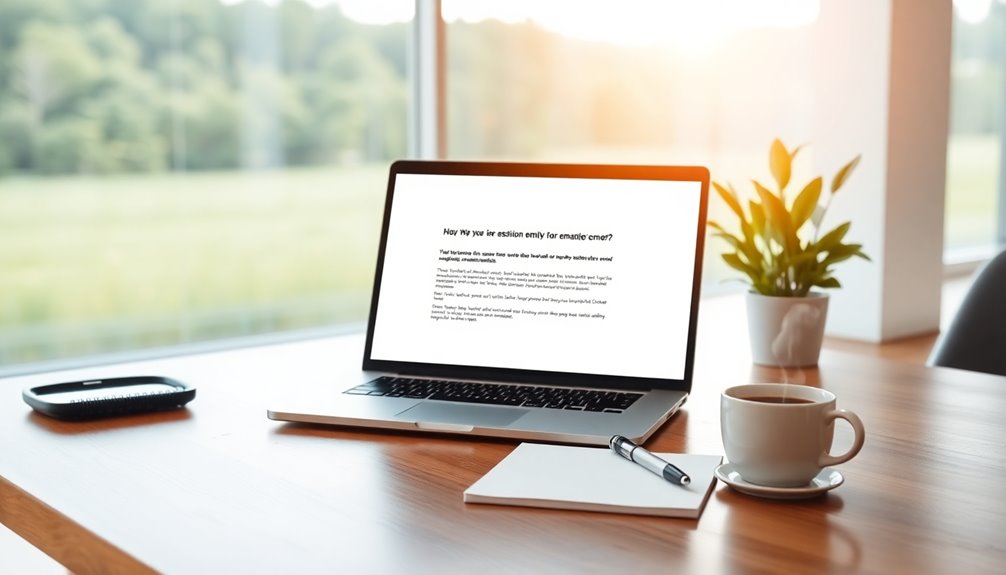To write a professional and polite two weeks' notice email, start with a clear subject line that includes your intention to resign. In the first sentence, state your resignation and last working day. Express gratitude for the opportunities and experiences you've had, showing appreciation for your colleagues and the support you've received. Offer assistance during the transition to ensure a smooth handover. Maintain a respectful tone and avoid negative comments. Lastly, proofread your email to ensure clarity and professionalism. There's plenty more you can learn to perfect your resignation message and leave a positive impression.
Key Takeaways
- Start with a clear subject line such as "Resignation – [Your Name]" to indicate your intention immediately.
- Clearly state your resignation and last working day in the first sentence for straightforward communication.
- Express gratitude for the opportunities and experiences gained during your time at the company.
- Offer to assist with the transition, including training a replacement or documenting processes.
- Proofread your email for professionalism and clarity before sending it to the appropriate recipient.
Introduction

When you decide to leave a job, writing a two-week notice email is an essential step in ensuring a smooth transition. This email serves as a formal notification of your resignation and typically states your last working day. By crafting a two-week notice email, you demonstrate professionalism, which is crucial in any work environment.
In your message, it's important to express gratitude for opportunities you've received during your employment. This not only maintains positive relationships but also leaves a good impression on your employer.
To make your email effective, keep it concise and focused; stick to the key points without overwhelming your recipient with unnecessary details. A clear subject line indicating your resignation helps ensure that your email is easily identifiable and addressed promptly by your supervisor.
Additionally, offering assistance during the transition period shows your commitment to a smooth handover process. This gesture reflects professionalism and can positively impact your future references.
Maintains Professional Relationships

A two-week notice email significantly enhances your chances of maintaining professional relationships after leaving a job. By providing this formal notice, you demonstrate professionalism and respect for your employer and colleagues. This respectful resignation process fosters goodwill, making it easier to leave on a positive note.
Expressing gratitude for the opportunities you've had during your tenure reinforces positive feelings and helps ensure a lasting, amicable relationship. When you acknowledge the support and experiences gained, it contributes to a smoother transition for both you and your employer.
It's essential to maintain professionalism throughout this process, as it prevents any potential negative impressions that could affect your reputation in the industry. In today's job market, positive relationships can lead to future networking opportunities, and your former employers may serve as valuable references down the line.
Remember, 85% of employers appreciate receiving a two-week notice, highlighting the importance of professionalism in your resignation communications. By writing a professional email, you not only uphold your reputation but also help ensure that your departure is perceived positively.
Ultimately, this thoughtful approach maintains positive relationships that can benefit you long after you've moved on.
Clear and Direct Subject Line

Clarity is essential when crafting your two-week notice email, and this starts with a clear and direct subject line. Use a subject line that clearly states your intention, like "Resignation – [Your Name]" or "Two-Week Notice – [Your Name]." This ensures immediate recognition by the recipient. Keeping it concise, ideally within 8-12 words, helps maintain professionalism and respect for the reader's time.
You should avoid ambiguous phrases like "Important Update" or "Change in Employment," as these can lead to confusion about the email's purpose. Including your job title in the subject line can provide valuable context, especially in larger organizations where multiple employees may share similar names. This small detail adds to your professional courtesy and shows you respect the recipient's need for clarity.
A polite yet straightforward subject line reflects the professionalism of the message within the email body. By clearly stating your resignation notice, you set a serious tone and underscore your intention to resign. This not only helps in effective communication but also aids in maintaining professionalism as you transition out of your role.
Step-by-Step Guide to Writing Resignation Emails

Crafting a resignation email can feel daunting, but breaking it down into manageable steps makes the process smoother.
Start with a clear subject line that indicates your intention, like "Resignation Notice" or "Two Weeks Notice." In the body of your email, state your intention to resign in the first sentence and specify your last working day, ensuring it's at least two weeks from the date you send it. This timeframe allows for a smoother transition, similar to how effective communication can prevent misunderstandings in relationships.
Next, express gratitude for the opportunities and experiences you've gained during your time at the company. This helps maintain positive relationships even as you transition out. You might say something like, "I appreciate the support and knowledge I've received here," as maintaining these connections can be beneficial for future endeavors.
Offer assistance during the transition period, perhaps by training a replacement or completing outstanding tasks. This demonstrates your professionalism and willingness to help. Additionally, ensure that you manage your emotions during this transition, as emotional regulation can be crucial for maintaining professionalism and clarity in communication. Staying resilient during this process can also contribute to a more positive outcome, just as it does in navigating difficult conversations.
Dos and Don'ts for Subject Lines

When sending a resignation email, the subject line plays a significant role in conveying your message effectively. Start with a clear and direct subject line that includes the word "resignation." This ensures immediate recognition of the email's purpose. For example, "Resignation Notice – [Your Name]" is both professional and straightforward.
It's essential to keep the subject line concise, ideally under 50 characters. This way, it remains fully visible in inbox previews, making it easier for your manager to spot. Avoid vague subject lines like "Important Update," as these can lead to confusion and may not prompt immediate attention. You want your intent to be unmistakable.
Also, refrain from using casual language or emojis in the subject line. This can undermine the professionalism of your resignation notice. Including your name can help with easy identification, especially if multiple resignations occur within the company.
Resignation Email Samples

Looking for examples of resignation emails can make the process smoother and less stressful. A well-crafted resignation email should include a clear subject line like "Resignation – [Your Name]."
Start with a personalized greeting, addressing your supervisor appropriately.
In the body, clearly state your intention to resign and mention your last day of work, ensuring it's at least two weeks from the date of your email. For example, "I am writing to formally resign from my position, with my last day of work being [date]."
It's essential to express gratitude for the opportunities and experiences you've gained during your time at the company. You might say, "I appreciate the support and guidance during my tenure here." This helps maintain positive relationships.
Conclude your email by offering to assist during the transition period, which shows professionalism. A phrase like, "I'm happy to help with the transition plan," can be effective.
Pro Tips for Writing Effective Emails

Effective emails are crucial for clear communication in any professional setting, and following a few key tips can make your messages stand out.
When writing your two weeks notice, start with a clear subject line, like "Resignation – [Your Name]." This ensures your resignation email is immediately recognizable to your supervisor.
Begin with a respectful greeting, addressing your manager appropriately to establish a professional tone.
In the body, keep your message concise: state your intention to resign, your last working day, and express gratitude for the opportunities you've had. This helps maintain positive relationships, which is essential in any career.
Throughout your email, uphold a professional tone, steering clear of negative comments about the company or colleagues. This shows professionalism and respect, even as you exit.
Finally, don't forget to proofread your email before sending it. Checking for clarity and grammatical accuracy reflects your attention to detail and enhances your message's impact.
Final Thoughts

Crafting a thoughtful two weeks notice email can significantly impact your professional relationships. By providing a clear statement of resignation and your last working day, you eliminate any ambiguity about your departure. This clarity is crucial for both you and your employer as you navigate this transition.
Expressing gratitude towards your employer for the opportunities and experiences gained during your time there leaves a positive impression. It shows your professionalism and respect for the organization, which can be beneficial for future references or networking.
Additionally, offering assistance during the transition demonstrates your commitment to a smooth handover process. Keeping your tone positive and concise not only maintains professionalism but also helps you leave a lasting, favorable impression.
A well-crafted two-week notice letter can serve as a stepping stone to a positive future, allowing you to maintain professional relationships long after you've moved on. Remember, how you handle your departure can influence your career trajectory.
Frequently Asked Questions
How Do You Write a Professional 2 Week Notice Email?
To write a professional two-week notice email, start with a clear subject line that states your resignation.
Begin with a polite greeting, addressing your supervisor by name.
Clearly state your intention to resign and include your last working day, giving at least two weeks' notice.
Express gratitude for the opportunities you've had and offer assistance during the transition.
This approach helps maintain a positive relationship as you move on to your next chapter.
How Do You Respectfully Give a Two-Week Notice?
When you're ready to give your two-week notice, meet with your supervisor first to share your decision in person.
Clearly state your last working day and express gratitude for the experiences you've gained.
Offer to help during the transition, whether that's training a replacement or wrapping up projects.
Always maintain a respectful tone and avoid negative comments about the company, ensuring you leave on good terms and uphold your professional reputation.
How Do You Politely Resign in an Email?
When you're ready to resign via email, start with a clear subject line, like "Resignation Notice."
In your opening, state your intention to resign and mention your last working day.
Keep a positive tone throughout, expressing gratitude for your experiences.
Offer to assist during the transition, whether that's training a replacement or wrapping up projects.
How Do You Write a Friendly Resignation Email?
When you're ready to write a friendly resignation email, start with a warm greeting to your supervisor.
Clearly state your intention to resign and mention your last working day to avoid any confusion.
Express your gratitude for the experiences you've had and the opportunities you've been given.
Lastly, offer your help during the transition. This shows your willingness to leave on good terms and reinforces a positive relationship with your company.









